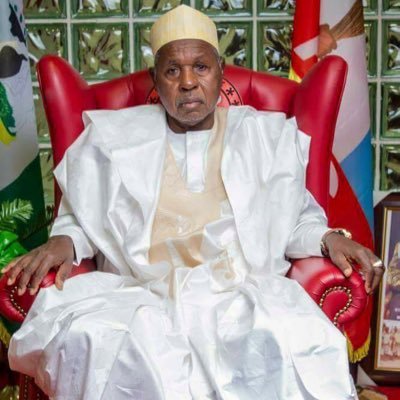Nigeria Breaking News
Nigeria will do well under Tinubu – Katsina Gov, Masari

Katsina State Governor, Aminu Bello Masari has expressed optimism that Nigeria under the newly elected President, Asiwaju Ahmed Tinubu would prosper beyond measurable doubts. Masari who disclosed this shortly after INEC announced Tinubu as a winner of the 2023 presidential election said: “Tinubu is competent and capable of leading the country to the promised land.
The Katsina Governor said Nigeria under the former Lagos Governor would experience the needed socio-economic development, same as Lagos. The man (Tinubu) has got the brain and the capacity. He is an effective manager of men and resources. “I have no doubt that he’s going to galvanise the nation and propel it to greater heights, making it a pride not only of Black Africans but of all Blacks all over the world. He did it in Lagos and he will do it for Nigeria,” Masari said.
Masari who recalled the horrible state of Lagos before Tinubu became its Governor said, “Lagos in 1999 was a city invaded by ‘Area Boys’ almost similar to the bandits operating in the North. Before Asiwaju came on board, in Lagos, you find dead bodies on heaps of rubbish and roads being crushed by vehicles by daytime, like 3pm.
“Cars without air condition have to wind their glasses up because of ‘Area Boys’ but today Lagos is the safest city in Nigeria due to his efforts.
“And what was the economy of Lagos before he became Governor? The revenue generation was barely N600 million but before he left, it was N6 billion.
Source: Daily post
In other news – Ohanaeze congratulates President-Elect Tinubu
The Ohanaeze Ndigbo, the apex Igbo socio-cultural organization, has vowed to support the President-elect, Bola Tinubu until a court of competent says otherwise. Okechukwu Isiguzoro, the Secretary-General of Ohanaeze, disclosed this while urging Tinubu to reach out to other presidential candidates in the spirit of fairness.
Speaking with DAILY POST, Isiguzoro congratulated Tinubu on his victory at Saturday’s presidential election.
He, however, lamented that the just-concluded presidential election was flawed. Learn more
Nigeria Breaking News
Ogun govt advocates proper documentation in orphanages

Ogun State Commissioner for Women Affairs and Social Development, Adijat Adeleye, has harped on the need for proper documentation of children in orphanages residing in the state. Adeleye stated that improved data analysis is necessary to ensure accountability, safety, transparency, and efficiency in the administration of homes.
The commissioner made this known during a training program for social workers, organized by the Ministry in collaboration with Both Ends Believing (BEB) and the Association of Orphanage and Home Operators in Nigeria (ASOHON) at Oke-Mosan, Abeokuta, on Friday.She reiterated the state government’s commitment to the welfare and well-being of all children in the state, regardless of their status, noting that their rights must be protected and that they should have a sense of belonging.
Adeleye said: “I want you to know that the present administration in Ogun State is committed to the welfare of all children in the state, and the era of being complacent is gone; whether as social workers or orphanage home operators, this time there is a need for us to have proper documentation of what is going on in our homes, both for present reasons and for the future of the children and the homes we run.”
The commissioner urged the trainees to take advantage of the training to enhance their career paths and provide efficient services in their line of duties.
Speaking, the National President of the Association of Orphanage and Home Operators in Nigeria, Dr. Gabriel Oyediji, explained that the objective of the training was to ensure a paradigm shift in keeping children’s records from analog to digital, towards achieving accuracy and timeliness in the management of children’s welfare.
Delivering a lecture on creating child-first software for orphanage homes, the Country Manager of BEB, Mr. Silas Nyam, highlighted some of the benefits of the software application for orphanage homes, which include storing and tracking children’s personal, medical, and educational records, monitoring children’s progress, goals and outcomes, and managing counseling therapy, among other things.
Appreciating the Ministry and other partners, representatives of the social workers, Adesola Omobolaji and Talabi Olusesan, said the training would be beneficial in enhancing quality service delivery in the discharge of their duties.
Source: Dailypost
Nigeria Breaking News
2027 election not on my mind now – President Bola Tinubu

President Bola Tinubu said he is not thinking about the upcoming 2027 general elections but instead dedicated to restructuring the economy for the benefit of the Nigerian people.
This is coming as several prominent figures from the All Progressives Congress, APC, including former national chairman. Chief Bisi Akande, former Ogun State governor, Aremo Olusegun Osoba, Lagos State Governor Babajide Sanwo-Olu, and governors from Ogun, Ondo, and Ekiti states—Dapo Abiodun, Lucky Aiyedatiwa, and Biodun Oyebanji, respectively—expressed their support for President Tinubu’s re-election and the success of all APC candidates in 2027.
Tinubu and the party leaders made these comments at the 2024 South West Assembly of the APC, held on Saturday at Victoria Island, hosted by Governor Sanwo-Olu, who serves as the zonal coordinator of the party.The event had in attendance party leaders and stakeholders from the South-West including senators, members of the House of Representatives, State House of Assembly members, local government officials, and top party representatives.
At the event, former Ekiti State governor, Kayode Fayemi, delivered the keynote address, praising the president as a “listening leader” with a strong determination to succeed.
Tinubu, who was represented by his chief of staff, Femi Gbajabiamila, urged Nigerians to be patient with his administration, which is committed to the genuine progress of the populace.
Source: Dailypost
In other news –
Nigeria Breaking News
Zenith Bank announces service restoration to customers nationwide

Nigeria’s tier-one bank, Zenith Bank has announced that its customers can perform transactions seamlessly on all its channels. The Bank disclosed this in a notice on Friday. This comes after the bank had earlier announced service disruption on Tuesday due to system maintenance.
In an update, Zenith Bank urged its customers that services have been restored across all its Channels, including Zenith Bank Debit, Credit and Prepaid cards, Automated Teller Machines, ATMs, Point of Sales terminals, POS, Mobile Apps, Internet Banking Platforms and Agents nationwide (Agent Banking).
This means that customers will not experience difficulties accessing services on its Channels.
“Dear Valued Customer,
We are pleased to inform you that you can now perform transactions conveniently, with the following Zenith Bankchannels:
Zenith Bank Debit, Credit and Prepaid cards
Zenith Bank Automated Teller Machines (ATMs), Zenith Bank Point of Sales terminals (POS), Zenith Bank Mobile App, Zenith Bank Internet Banking Platform Zenith Agents nationwide (Agent Banking). You can also visit any of our branches nationwide to perform your
transactions.
Source: Dailyspost


